大学英语四级第二次课程
2014-2015-1学期 2014级《大学英语》分级课表
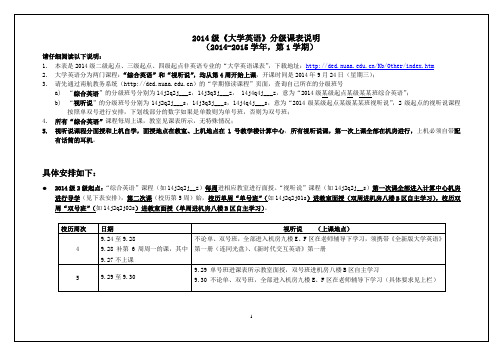
日起
视听说(上课地点)
4
9.24至9.28
所有视听说班级进机房七楼A、B、C、D、E、F区在老师辅导下学习,须携带《新标准大学英语(综合教程)》第一册(连光盘)、《新标准大学英语(视听说)》第一册(连光盘)
5
9.29、9.30
9.29日,所有班级进课表所示教室面授。
9.30日,所有班级进计算中心机房七楼A、B、C、D、E、F区(具体要求见上栏)
14j2q2j08z刘英7110
14j2q2j19s, 20s娄成英7109
14j3q3j14z刘长江7204
14j3q3j43z刘莺7202
14j3q3j16z刘芳7108
14j3q3j17z徐以中2506
14j3q3j18z陈博7310
14j3q3j19s俞建梁2205
14j3q3j44s毛红霞7106
14j3q3j15z王真7408
14j3q3j19z俞建梁2105
14j3q3j44z毛红霞7405
14j3q3j45z何烨2106
14j3q3j46z汪旭7406
14j3q3j14s张卫东7407
14j3q3j16s刘芳7203
14j3q3j17s徐以中2208
14j3q3j43s刘莺7404
14j3q3j18s陈博7409
校历周次
日期
视听说(上课地点)
4
9.24至9.28
9.28补第6周周一的课,其中9.27不上课
不论单、双号班,全部进入机房九楼E、F区在老师辅导下学习,须携带《全新版大学英语》第一册(连同光盘)、《新时代交互英语》第一册
5
9.29至9.30
9.29单号班进课表所示教室面授,双号班进机房八楼B区自主学习
阅读第二讲 大学英语四级快速阅读

Words that show addition 补充性过渡词
Additional words signal added ideas. These words tell you a writer is presenting one or more ideas that continue along the same line of thought as a previous idea. Like all translations, addition words help writers organize their information that present it clearly to readers.
Additional words:
One First first of all For one thing To begin with Another Second also
In addition Next Moreover Furthermore Last Last of all finally
Authors use two common methods to show relationships and make their ideas clear. 1. transition 2. patterns of organization
Transitions过渡
Transitions are words or phrases that show the relationships between ideas. They are like signs on the road that guide travelers. Two major types of transitions are words that show addition and words that show time.
大学英语4级课程设计

大学英语4级课程设计一、课程目标知识目标:1. 学生能掌握并运用大学英语四级词汇、短语和基本语法结构。
2. 学生能理解并运用课文中不同题材和体裁的语言特点。
3. 学生能掌握一定的阅读策略,提高阅读速度和理解能力。
技能目标:1. 学生具备运用英语进行日常交流、撰写短文和阅读理解的能力。
2. 学生能通过听力训练,提高听力水平和获取关键信息的能力。
3. 学生能通过口语练习,提高口语表达能力和语言运用灵活性。
情感态度价值观目标:1. 学生在学习过程中,培养对英语学习的兴趣和自信心,形成良好的学习习惯。
2. 学生通过学习英语,了解西方文化,拓宽国际视野,提高跨文化交际意识。
3. 学生在学习中,培养合作精神,学会尊重他人,形成积极向上的人生态度。
课程性质:本课程为大学英语四级课程,旨在提高学生的英语综合运用能力,为今后的学习、工作和发展奠定基础。
学生特点:学生已具备一定的英语基础,但对四级考试的内容和形式尚不熟悉,需要在课程中逐步提高。
教学要求:教师应结合课本内容,设计丰富的教学活动,注重培养学生的实际应用能力,使学生在学习过程中达到课程目标,为四级考试做好准备。
同时,关注学生的学习进度和情感需求,确保课程目标的实现。
二、教学内容本课程依据课程目标,选择以下教学内容:1. 词汇与短语:依据四级词汇表,选取并学习课程相关的高频词汇和短语,涵盖不同主题,帮助学生扩大词汇量。
2. 语法:复习并巩固大学英语基本语法,重点讲解课程中出现的高级语法结构,提高学生的语法运用能力。
3. 阅读理解:选取教材中的各类文章,涵盖叙述、说明、议论等体裁,训练学生的阅读技巧,提高阅读速度和理解能力。
4. 听力训练:采用四级听力材料,进行听力技巧训练,包括短对话、长对话、短文理解和听写等,提高学生的听力水平。
5. 口语表达:结合教材话题,开展口语讨论、角色扮演等活动,锻炼学生的口语表达能力。
6. 写作技巧:学习教材中的范文,分析文章结构、写作技巧,进行四级写作训练,包括短文写作和图表作文。
[全]2013年12月大学英语四级考试真题及答案(汇总共三套)--第二套
![[全]2013年12月大学英语四级考试真题及答案(汇总共三套)--第二套](https://img.taocdn.com/s3/m/26bad609fbd6195f312b3169a45177232f60e433.png)
2013年12月大学英语四级考试真题(二)Part 1 writin g (30 minute s)Direct ions:For this part, you are allowe d 30 minute s to write a shortessay b asedon the pictur e below. You should startyour essaywith a briefaccoun t of the increa singuse of the mobile phonein people’s life and then explai n the conse q u ence s of overus ing it.You should writeat leastIW wordsbut no more than 180 words .People are crossi ng the street lookin g at theircell phones and usingwalki n g sticks in orderto see.Part 2 Listen ing Compre hensi on (30 minute s)Section ADirect ions: In this sectio n, you will hear 8 shortconver satio ns and 2 long conver satio ns. At the end of each conver satio n, one or more questi ons will be asked a boutwhat was said. Both the conver satio n and the questi ons will be spoken only once. Aftereach questi on therewill be a pause. During the pause,you must read the four choices marked A), B), C) and D), and decide whichthe best answer is. Then mark the corres pondi ng letter o" Answer Sheet 1 with a single line throug h the centr e.注意:此部分试题请在答题卡1上作答。
大学英语课程分级分类教学实施方案详解
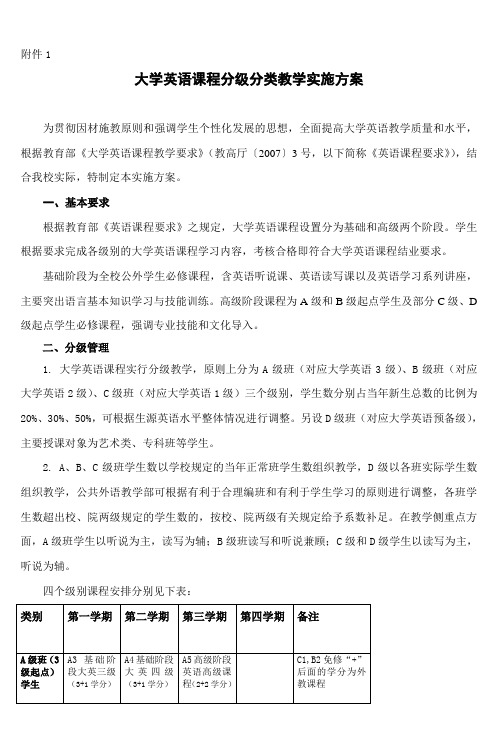
附件1大学英语课程分级分类教学实施方案为贯彻因材施教原则和强调学生个性化发展的思想,全面提高大学英语教学质量和水平,根据教育部《大学英语课程教学要求》(教高厅〔2007〕3号,以下简称《英语课程要求》),结合我校实际,特制定本实施方案。
一、基本要求根据教育部《英语课程要求》之规定,大学英语课程设置分为基础和高级两个阶段。
学生根据要求完成各级别的大学英语课程学习内容,考核合格即符合大学英语课程结业要求。
基础阶段为全校公外学生必修课程,含英语听说课、英语读写课以及英语学习系列讲座,主要突出语言基本知识学习与技能训练。
高级阶段课程为A级和B级起点学生及部分C级、D 级起点学生必修课程,强调专业技能和文化导入。
二、分级管理1. 大学英语课程实行分级教学,原则上分为A级班(对应大学英语3级)、B级班(对应大学英语2级)、C级班(对应大学英语1级)三个级别,学生数分别占当年新生总数的比例为20%、30%、50%,可根据生源英语水平整体情况进行调整。
另设D级班(对应大学英语预备级),主要授课对象为艺术类、专科班等学生。
2. A、B、C级班学生数以学校规定的当年正常班学生数组织教学,D级以各班实际学生数组织教学,公共外语教学部可根据有利于合理编班和有利于学生学习的原则进行调整,各班学生数超出校、院两级规定的学生数的,按校、院两级有关规定给予系数补足。
在教学侧重点方面,A级班学生以听说为主,读写为辅;B级班读写和听说兼顾;C级和D级学生以读写为主,听说为辅。
四个级别课程安排分别见下表:3. 新生入学后自愿报名参加大学英语分级考试,按成绩进入A级、B级或C级班。
不参加分级考试者,直接进入C级班;列入高级班的同学可以申请进入低级班学习;列入低级班的同学不能申请进入高级班学习。
根据生源情况和学生意愿进行分级后,进入B级班(二级起点班)学习的同学,大学英语C1(一级)课程免修;进入A级班(三级起点班)学习的同学,大学英语C1、B2(一、二级)课程免修。
《英语四级考试》课程教学大纲
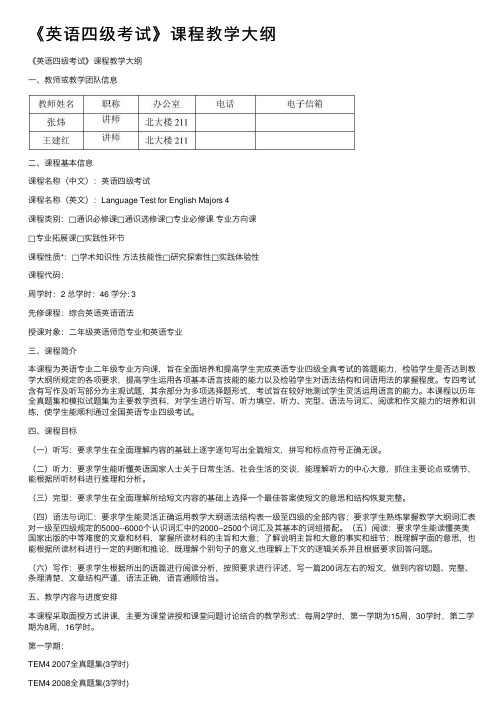
《英语四级考试》课程教学⼤纲《英语四级考试》课程教学⼤纲⼀、教师或教学团队信息⼆、课程基本信息课程名称(中⽂):英语四级考试课程名称(英⽂):Language Test for English Majors 4课程类别:□通识必修课□通识选修课□专业必修课专业⽅向课□专业拓展课□实践性环节课程性质*:□学术知识性⽅法技能性□研究探索性□实践体验性课程代码:周学时:2 总学时:46 学分: 3先修课程:综合英语英语语法授课对象:⼆年级英语师范专业和英语专业三、课程简介本课程为英语专业⼆年级专业⽅向课,旨在全⾯培养和提⾼学⽣完成英语专业四级全真考试的答题能⼒,检验学⽣是否达到教学⼤纲所规定的各项要求,提⾼学⽣运⽤各项基本语⾔技能的能⼒以及检验学⽣对语法结构和词语⽤法的掌握程度。
专四考试含有写作及听写部分为主观试题,其余部分为多项选择题形式,考试旨在较好地测试学⽣灵活运⽤语⾔的能⼒。
本课程以历年全真题集和模拟试题集为主要教学资料,对学⽣进⾏听写、听⼒填空、听⼒、完型、语法与词汇、阅读和作⽂能⼒的培养和训练,使学⽣能顺利通过全国英语专业四级考试。
四、课程⽬标(⼀)听写:要求学⽣在全⾯理解内容的基础上逐字逐句写出全篇短⽂,拼写和标点符号正确⽆误。
(⼆)听⼒:要求学⽣能听懂英语国家⼈⼠关于⽇常⽣活、社会⽣活的交谈,能理解听⼒的中⼼⼤意,抓住主要论点或情节,能根据所听材料进⾏推理和分析。
(三)完型:要求学⽣在全⾯理解所给短⽂内容的基础上选择⼀个最佳答案使短⽂的意思和结构恢复完整。
(四)语法与词汇:要求学⽣能灵活正确运⽤教学⼤纲语法结构表⼀级⾄四级的全部内容;要求学⽣熟练掌握教学⼤纲词汇表对⼀级⾄四级规定的5000--6000个认识词汇中的2000--2500个词汇及其基本的词组搭配。
(五)阅读:要求学⽣能读懂英美国家出版的中等难度的⽂章和材料,掌握所读材料的主旨和⼤意;了解说明主旨和⼤意的事实和细节;既理解字⾯的意思,也能根据所读材料进⾏⼀定的判断和推论,既理解个别句⼦的意义,也理解上下⽂的逻辑关系并且根据要求回答问题。
2024年大学英语四级考试技巧重点总结
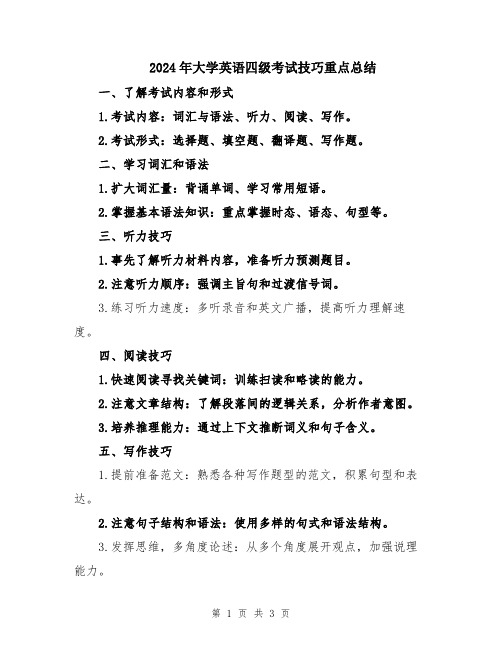
2024年大学英语四级考试技巧重点总结一、了解考试内容和形式1.考试内容:词汇与语法、听力、阅读、写作。
2.考试形式:选择题、填空题、翻译题、写作题。
二、学习词汇和语法1.扩大词汇量:背诵单词、学习常用短语。
2.掌握基本语法知识:重点掌握时态、语态、句型等。
三、听力技巧1.事先了解听力材料内容,准备听力预测题目。
2.注意听力顺序:强调主旨句和过渡信号词。
3.练习听力速度:多听录音和英文广播,提高听力理解速度。
四、阅读技巧1.快速阅读寻找关键词:训练扫读和略读的能力。
2.注意文章结构:了解段落间的逻辑关系,分析作者意图。
3.培养推理能力:通过上下文推断词义和句子含义。
五、写作技巧1.提前准备范文:熟悉各种写作题型的范文,积累句型和表达。
2.注意句子结构和语法:使用多样的句式和语法结构。
3.发挥思维,多角度论述:从多个角度展开观点,加强说理能力。
六、备考时间管理1.制定学习计划:合理分配时间,确定每天的学习目标。
2.多做模拟题和真题:熟悉考试内容和形式,提高应试能力。
3.利用好课余时间:听听力、看长篇阅读材料、练习写作。
七、调整心态,保持自信1.相信自己的能力,肯定自己的努力。
2.积极面对挑战,不轻易放弃。
3.保持良好的心态,保持积极、乐观的心情。
八、多维度备考1.多听多说:多听英文广播、英语课程和英文歌曲,多进行英语口头交流。
2.多读多写:阅读英文文章,扩大词汇量,培养写作能力。
3.多练多做题:进行大量练习,提高应试技巧。
九、注意备考效益1.评估学习情况:及时发现问题,调整学习计划。
2.复习知识点:重点复习易错点和薄弱环节。
3.扩充知识面:广泛阅读相关英语学习资料,培养语感。
十、考前准备1.规划复习内容:制定考前一周的复习计划,合理安排每天的复习内容。
2.模拟考试:模拟考试,熟悉考试流程和时间限制。
3.调整作息和心态:保证充足的睡眠和休息,保持良好的心态。
总结:通过系统的学习和合理的备考安排,相信你一定能够顺利通过____年大学英语四级考试。
大学英语四级考试(全国性英语等级考试)

谢谢观看
由国家教育部任命成立“全国大学英语四、六级考试委员会”,考试委员会由全国若干重点大学的有关教授 和专家组成,设顾问二人,主任委员一人,副主任委员若干人,专业委员会委员和咨询委员会委员各若干人。全 国大学英语四、六级考试委员会在学术上、组织上对大学英语考试负责。部分考务工作由“教育部考试中心”负 责。考试委员会设办公室作为常设办事机构。
听力比重加大
和传统笔试重阅读有很大不同的是,机考更注重听力,听力比重占70%。作文部分也融入了听力要求,首先 要看一段视频,看懂了视频以后在作文里简单描述视频内容,并阐发自己的观点。“如果没有听懂视频,作文就 根本无从下手。”
增加跟读环节
在听力部分后面增加了跟读的环节,需要考生对着计算机的麦克风重复之前听到的对话,以此考查考生的口 语是否标准。所以在考试前,考生们需要调试计算机的麦克风音量。
通常情况下为每年6月份、12月份的第三个星期六。
推动大学英语教学大纲的贯彻执行,对大学生的英语能力进行客观、准确的测量,为提高中国大学英语课程 的教学质量服务。
参考资料:
考试内容
笔试
口试
参考资料:
四级口试采用计算机化考试形式.模拟考官及试题呈现在计算机屏幕上,试题材料采用文字或画面提示(图画、 图表、照片等).考生由计算机系统随机编排为两人一组。考生在计算机上进行考生与模拟考官、考生与考生之间 的互动.考试包含四个任务,考试总时间约15分钟。
商务英语是以适应职场生活的语言要求为目的,内容涉及到商务活动的方方面面。商务英语课程不只是简单 地对学员的英文水平、能力的提高,它更多地是向学员传授一种西方的企业管理理念、工作心理,甚至是如何和 外国人打交道,如何和他们合作、工作的方式方法,以及他们的生活习惯等,从某种程度上说是包含在文化概念 里的。
2024年四级和大英竞赛相比哪个难,公共英语三级跟大学四级哪个容易考-华宇考试网

发布于:华宇考试网(https:///)>>> 英语四级成绩查询栏目(https:///yingyu4ji/cx/)
投稿人:网友投稿
说明:因政策和内容的变化,上文内容可供参考,最终以官方公告内容为准!
声明:该文观点仅代表作者本人,华宇考试网系信息发布平台,仅提供信息存储空间服务。对内容有建议或侵权投诉请联系邮箱:********************
关注本站了解更多关于文四级和大英竞赛相比哪个难,公共英语三级跟大学四级哪个容易考和英语四级成绩查询的相关信息。
公共英语三级跟大学四级哪个容易?
公共英语三级比大学四级容易。1. 因为公共英语三级考试内容对比大学四级更简单,语法和词汇量都要求较少。2. 公共英语三级的考试时间也比大学四级短,唯有2小时,而大学四级的考试时间是2.5小时。3. 除开这点公共英语三级考试时间分配更为合理,获取高分的门槛比大学四级低。因为这个原因,综合来看,公共英语三级相对来说更容易通过。
1. 考试内容差异:公共英语三级考试试卷主要测试英语的基础知识和实质上运用能力,涵盖听力、阅读、写作和翻译等方面。而大学英语四级考试试卷则更加重视英语地运用能力和语言感知,涉及的语言难度和应用场景更为复杂。
2. 考试对象的不一样:公共英语三级考试试卷主要面向高中和中职学生、大学生还有其他英语学习者,而大学英语四级考试试卷则主要面向本科生,学员的英语基础和学习经历可能会带来一定不一样。
四级考试和大英竞赛是完全不一样的考试类型,难度大小很难直接进行比较。
四级考试是中国大学英语四级考试,也称CET-4是中国教育部主管的全国性英语考试和评级标准之一,考核学员英语听、说、读、写的能力。大多数情况下要求学员具备一定的英语听说读写能力,考试难度适中,难度可能会随着每一年的考试试卷难度而出现变化。
2024年大学英语四级教案
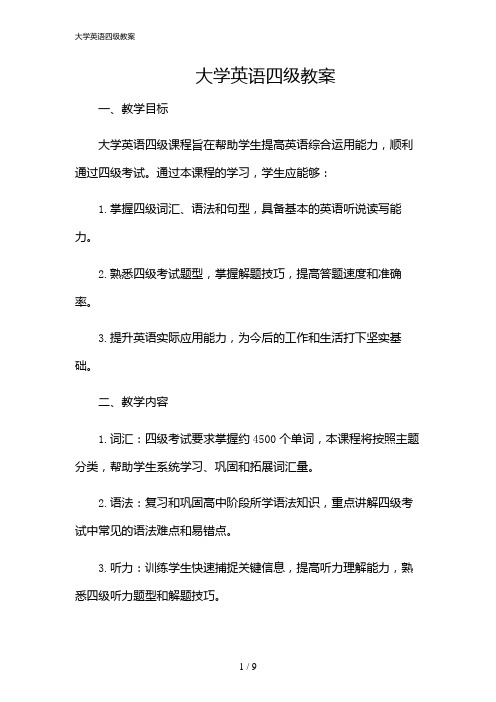
大学英语四级教案一、教学目标大学英语四级课程旨在帮助学生提高英语综合运用能力,顺利通过四级考试。
通过本课程的学习,学生应能够:1.掌握四级词汇、语法和句型,具备基本的英语听说读写能力。
2.熟悉四级考试题型,掌握解题技巧,提高答题速度和准确率。
3.提升英语实际应用能力,为今后的工作和生活打下坚实基础。
二、教学内容1.词汇:四级考试要求掌握约4500个单词,本课程将按照主题分类,帮助学生系统学习、巩固和拓展词汇量。
2.语法:复习和巩固高中阶段所学语法知识,重点讲解四级考试中常见的语法难点和易错点。
3.听力:训练学生快速捕捉关键信息,提高听力理解能力,熟悉四级听力题型和解题技巧。
4.阅读:培养学生快速阅读、准确理解的能力,掌握四级阅读题型和解题技巧。
5.写作:教授各类作文模板,提高学生的写作能力,熟悉四级写作题型和要求。
6.翻译:训练学生准确、流畅地进行中英文互译,熟悉四级翻译题型和解题技巧。
三、教学方法1.课堂讲解:教师对词汇、语法、题型等进行详细讲解,帮助学生理解和掌握。
2.案例分析:通过分析历年四级真题,使学生熟悉考试题型和答题技巧。
3.小组讨论:分组讨论,培养学生合作精神和解决问题的能力。
4.情景模拟:模拟实际考试场景,提高学生的应试能力。
5.课后作业:布置适量课后作业,巩固所学知识,提高学生的自学能力。
四、教学安排1.阶段一(1-4周):词汇学习,每天学习一定数量的单词,并进行复习和测试。
2.阶段二(5-8周):语法学习,每周讲解一个语法点,配合练习题进行巩固。
3.阶段三(9-12周):听力训练,每天进行听力练习,提高听力理解能力。
4.阶段四(13-16周):阅读训练,每天进行阅读练习,提高阅读速度和理解能力。
5.阶段五(17-20周):写作和翻译训练,每周布置一篇作文和翻译练习,提高写作和翻译能力。
五、教学评价1.平时成绩:包括课堂表现、作业完成情况和小组讨论等,占总评的40%。
2.期中考试:考察词汇、语法和听力等基础知识,占总评的20%。
【推荐】四级 - 《复旦大学大学英语教学大纲》
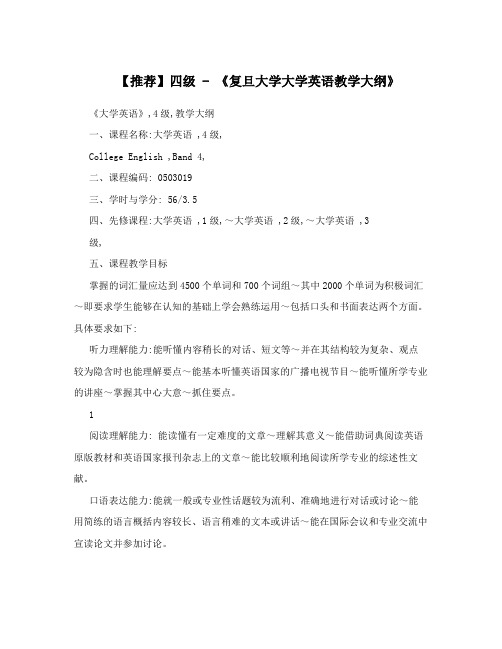
【推荐】四级 - 《复旦大学大学英语教学大纲》《大学英语》,4级,教学大纲一、课程名称:大学英语 ,4级,College English ,Band 4,二、课程编码: 0503019三、学时与学分: 56/3.5四、先修课程:大学英语 ,1级,~大学英语 ,2级,~大学英语 ,3级,五、课程教学目标掌握的词汇量应达到4500个单词和700个词组~其中2000个单词为积极词汇~即要求学生能够在认知的基础上学会熟练运用~包括口头和书面表达两个方面。
具体要求如下:听力理解能力:能听懂内容稍长的对话、短文等~并在其结构较为复杂、观点较为隐含时也能理解要点~能基本听懂英语国家的广播电视节目~能听懂所学专业的讲座~掌握其中心大意~抓住要点。
1阅读理解能力: 能读懂有一定难度的文章~理解其意义~能借助词典阅读英语原版教材和英语国家报刊杂志上的文章~能比较顺利地阅读所学专业的综述性文献。
口语表达能力:能就一般或专业性话题较为流利、准确地进行对话或讨论~能用简练的语言概括内容较长、语言稍难的文本或讲话~能在国际会议和专业交流中宣读论文并参加讨论。
书面表达能力:能就一般性主题比较自如地表达个人的观点~做到文章结构清晰、内容丰富、逻辑性强。
能用英语撰写所学专业的简短的报告和论文。
能在半小时内写出200词的说明文或议论文~内容完整~文理通顺~思想表达清楚。
翻译能力: 能借助词典翻译英语国家报刊上有一定难度的科普、文化、评论等文章~能翻译反映中国国情或文化的介绍性文章。
英汉译速为每小时400英语单词~汉英译速为每小时350个汉字~译文内容准确~基本无误译现象~文字通顺、达意~语言错误较少。
六、适用学科专业我校非英语专业的本科生。
七、教学内容与学时安排大学英语课程分为基础英语课程、中级英语课程、高级英语课程、英语选修课程和公共选修课程五个模块~目的是为了满足不同学生的2发展需要~保证英语教学四年不断线。
各个层次的课程设臵如下:基础英语课程:指传统的兼顾听、说、读、写、译等技能的通用大学英语课程。
2016年6月大学英语四级考试真题、听力原文及参考答案(第2套)
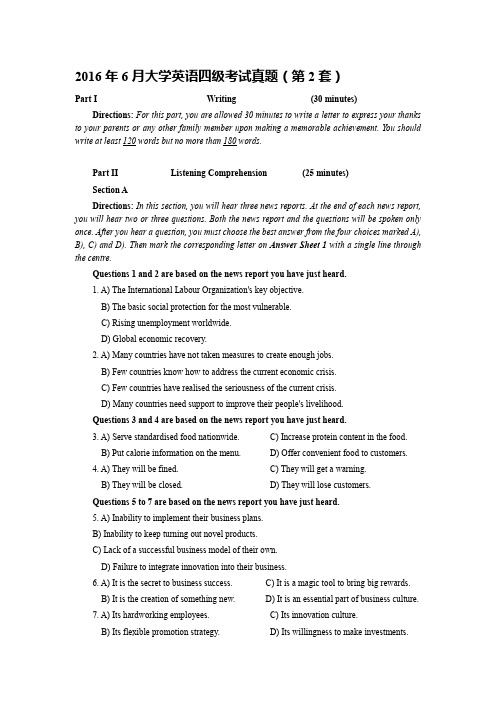
2016年6月大学英语四级考试真题(第2套)Part I Writing (30 minutes)Directions:For this part, you are allowed 30 minutes to write a letter to express your thanks to your parents or any other family member upon making a memorable achievement. You should write at least 120 words but no more than 180 words.Part II Listening Comprehension (25 minutes)Section ADirections:In this section, you will hear three news reports. At the end of each news report, you will hear two or three questions. Both the news report and the questions will be spoken only once. After you hear a question, you must choose the best answer from the four choices marked A), B), C) and D). Then mark the corresponding letter on Answer Sheet 1 with a single line through the centre.Questions 1 and 2 are based on the news report you have just heard.1. A) The International Labour Organization's key objective.B) The basic social protection for the most vulnerable.C) Rising unemployment worldwide.D) Global economic recovery.2. A) Many countries have not taken measures to create enough jobs.B) Few countries know how to address the current economic crisis.C) Few countries have realised the seriousness of the current crisis.D) Many countries need support to improve their people's livelihood.Questions 3 and 4 are based on the news report you have just heard.3. A) Serve standardised food nationwide.C) Increase protein content in the food.B) Put calorie information on the menu.D) Offer convenient food to customers.4. A) They will be fined. C) They will get a warning.B) They will be closed.D) They will lose customers.Questions 5 to 7 are based on the news report you have just heard.5. A) Inability to implement their business plans.B) Inability to keep turning out novel products.C) Lack of a successful business model of their own.D) Failure to integrate innovation into their business.6. A) It is the secret to business success. C) It is a magic tool to bring big rewards.B) It is the creation of something new.D) It is an essential part of business culture.7. A) Its hardworking employees. C) Its innovation culture.B) Its flexible promotion strategy. D) Its willingness to make investments.Section BDirections:In this section, you will hear two long conversations. At the end of each conversation, you will hear four questions. Both the conversation and the questions will be spoken only once. After you hear a question, you must choose the best answer from the four choices marked A), B), C) and D). Then mark the corresponding letter on Answer Sheet 1 with a single line through the centre.Questions 8 to 11 are based on the conversation you have just heard.8. A) He's got addicted to technology. C) He is crazy about text-messaging.B) He is not very good at socializing.D) He does not talk long on the phone.9. A) Talk big.C) Gossip a lot.B) Talk at length. D) Forget herself.10. A) He thought it was cool. C) He wanted to stay connected with them.B) He needed the practice.D) He had an urgent message to send.11. A) It poses a challenge to seniors. C) It is childish and unprofessional.B) It saves both time and money. D) It is cool and convenient.Questions 12 to 15 are based on the conversation you have just heard.12. A) He wants to change his job assignment.B) He is unhappy with his department manager.C) He thinks he deserves extra pay for overtime.D) He is often singled out for criticism by his boss.13. A) His workload was much too heavy. C) His colleagues often refused to cooperate.B) His immediate boss did not trust him. D) His salary was too low for his responsibility.14. A) He never knows how to refuse.C) His boss has a lot of trust in him.B) He is always ready to help others.D) His boss has no sense of fairness.15. A) Put all his complaints in writing. C) Learn to say no when necessary.B) Wait and see what happens next.D) Talk to his boss in person first.Section CDirections: In this section, you will hear three passages. At the end of each passage, you will hear three or four questions. Both the passage and the questions will be spoken only once. After you hear a question, you must choose the best answer from the four choices marked A), B), C) and D). Then mark the corresponding letter on Answer Sheet 1 with a single line through the centre.Questions 16 to 18 are based on the passage you have just heard.16. A) The importance of sleep to a healthy life.B) Reasons for Americans' decline in sleep.C) Some tips to improve the quality of sleep.D) Diseases associated with lack of sleep.17. A) They are more health-conscious. C) They get less and less sleep.B) They are changing their living habits. D) They know the dangers of lack of sleep.18. A) Their weight will go down. C) Their work efficiency will decrease.B) Their mind function will deteriorate.D) Their blood pressure will rise.Questions 19 to 21 are based on the passage you have just heard.19. A) How much you can afford to pay.B) What course you are going to choose.C) Which university you are going to apply to.D) When you are going to submit your application.20. A) The list of courses studied.C) The references from teachers.B) The full record of scores. D) The personal statement.21. A) Specify what they would like to do after graduation.B) Describe in detail how much they would enjoy studying.C) Indicate they have reflected and thought about the subject.D) Emphasize that they admire the professors in the university.Questions 22 to 25 are based on the passage you have just heard.22. A) It was equipped with rubber tyres.C) It was purchased by the Royal family.B) It was built in the late 19th century.D) It was designed by an English engineer.23. A) They consumed lots of petrol. C) They were difficult to drive.B) They took two passengers only.D) They often broke down.24. A) They were produced on the assembly line. C) They were modeled after British cars.B) They were built with less costly materials. D) They were made for ordinary use.25. A) It made news all over the world. C) It marked a new era in motor travel.B) It was built for the Royal family. D) It attracted large numbers of motorists.Part III Reading Comprehension (40 minutes)Section ADirections:In this section, there is a passage with ten blanks. You are required to select one word for each blank from a list of choices given in a word bank following the passage. Read the passage through carefully before making your choices. Each choice in the bank is identified by a letter Please mark the corresponding letter for each item on Answer Sheet 2 with a single line through the centre. You may not use any of the words in the bank more than once.Contrary to popular belief, older people generally do not want to live with their children. Moreover, most adult children 26 every bit as much care and support to their aging parents as was the case in the "good old days", and most older people do not feel 27 .About 80% of people 65 years and older have living children, and about 90% of them have28 contact with their children. About 75% of elderly parents who don't go to nursing homes live within 30 minutes of at least one of their children.However, 29 having contact with children does not guarantee happiness in old age. In fact, some research has found that people who are most involved with their families have the lowest spirits. This research may be 30 , however, as ill health often makes older people more 31 and thereby increases contact with family members. So it is more likely that poor health, not just family involvement, 32 spirits.Increasingly, researchers have begun to look at the quality of relationships, rather than at the frequency of contact, between the elderly and their children. If parents and children share interests and values and agree on childrearing practices and religious 33 , they are likely to enjoy each other's company. Disagreements on such matters can 34 cause problems. If parents are angered by their daughter's divorce, dislike her new husband, and disapprove of how she is raisingSection BDirections:In this section, you are going to read a passage with ten statements attached to it. Each statement contains information given in one of the paragraphs. Identify the paragraph from which the information is derived. You may choose a paragraph more than once. Each paragraph is marked with a letter Answer the questions by marking the corresponding letter on Answer Sheet 2.Could Food Shortages Bring Down Civilization?A) For many years I have studied global agricultural, population, environmental and economic trends and their interactions. The combined effects of those trends and the political tensions they generate point to the breakdown of governments and societies. Yet I, too, have resisted the idea that food shortages could bring down not only individual governments but also our global civilization.B) I can no longer ignore that risk. Our continuing failure to deal with the environmental declines that are undermining the world food economy forces me to conclude that such a collapse is possible.C) As demand for food rises faster than supplies are growing, the resulting food-price inflation puts severe stress on the governments of many countries. Unable to buy grain or grow their own, hungry people take to the streets. Indeed, even before the steep climb in grain prices in 2008, the number of failing states was expanding. If the food situation continues to worsen, entire nations will break down at an ever increasing rate. In the 20th century the main threat to international security was superpower conflict; today it is failing states.D) States fail when national governments can no longer provide personal security, food security and basic social services such as education and health care. When governments lose their control on power, law and order begin to disintegrate. After a point, countries can become so dangerous that food relief workers are no longer safe and their programs are halted. Failing states are of international concern because they are a source of terrorists, drugs, weapons and refugees (难民) threatening political stability everywhere.E) The surge in world grain prices in 2007 and 2008 --and the threat they pose to food security -- has a different, more troubling quality than the increases of the past. During the second half of the 20th century, grain prices rose dramatically several times. In 1972, for instance, the Soviets, recognizing their poor harvest early, quietly cornered the world wheat market. As a result, wheat prices elsewhere more than doubled, pulling rice and corn prices up with them. But this and other price shocks were event-driven -- drought in the Soviet Union, crop-shrinking heat in the U.S. Corn Belt. And the rises were short-lived: prices typically returned to normal with the next harvest.F) In contrast, the recent surge in world grain prices is trend-driven, making it unlikely to reverse without a reversal in the trends themselves. On the demand side, those trends include the ongoing addition of more than 70 million people a year, a growing number of people wanting to move up the food chain to consume highly grain-intensive meat products, and the massive diversion (转向) of U.S. grain to the production of bio-fuel.G) As incomes rise among low-income consumers, the potential for further grain consumption is huge. But that potential pales beside the never-ending demand for crop-based fuels.A fourth of this year's U.S. grain harvest will go to fuel cars.H) What about supply? The three environmental trends -- the shortage of fresh water, the loss of topsoil and the rising temperatures -- are making it increasingly hard to expand the world's grain supply fast enough to keep up with demand. Of all those trends, however, the spread of water shortages poses the most immediate threat. The biggest challenge here is irrigation, which consumes 70% of the world's fresh water. Millions of irrigation wells in many countries are now pumping water out of underground sources faster than rainfall can refill them. The result is falling water tables (地下水位) in countries with half the world's people, including the three big grain producers -- China, India and the U.S.I) As water tables have fallen and irrigation wells have gone dry, China's wheat crop, the world's largest, has declined by 8% since it peaked at 123 million tons in 1997. But water shortages are even more worrying in India. Millions of irrigation wells have significantly lowered water tables in almost every state.J) As the world's food security falls to pieces, individual countries acting in their own self-interest are actually worsening the troubles of many. The trend began in 2007, when leading wheat-exporting countries such as Russia and Argentina limited or banned their exports, in hopes of increasing local food supplies and thereby bringing down domestic food prices. Vietnam banned its exports for several months for the same reason. Such moves may eliminate the fears of those living in the exporting countries, but they are creating panic in importing countries that must rely on what is then left for export.K) In response to those restrictions, grain-importing countries are trying to nail down long-term trade agreements that would lock up future grain supplies. Food-import anxiety is evenleading to new efforts by food-importing countries to buy or lease farmland in other countries. In spite of such temporary measures, soaring food prices and spreading hunger in many other countries are beginning to break down the social order.L) Since the current world food shortage is trend-driven, the environmental trends that cause it must be reversed. We must cut carbon emissions by 80% from their 2006 levels by 2020, stabilize the world's population at eight billion by 2040, completely remove poverty, and restore forests and soils. There is nothing new about the four objectives. Indeed, we have made substantial progress in some parts of the world on at least one of these -- the distribution of family-planning services and the associated shift to smaller families.M) For many in the development community, the four objectives were seen as positive, promoting development as long as they did not cost too much. Others saw them as politically correct and morally appropriate. Now a third and far more significant motivation presents itself: meeting these goals may be necessary to prevent the collapse of our civilization. Yet the cost we project for saving civilization would amount to less than $200 billion a year, 1/6 of current global military spending. In effect, our plan is the new security budget.36. The more recent steep climb in grain prices partly results from the fact that more and more people want to consume meat products.37. Social order is breaking down in many countries because of food shortages.38. Rather than superpower conflict, countries unable to cope with food shortages now constitute the main threat to world security.39. Some parts of the world have seen successful implementation of family planning.40. The author has come to agree that food shortages could ultimately lead to the collapse of world civilization.41. Increasing water shortages prove to be the biggest obstacle to boosting the world's grain production.42. The cost for saving our civilization would be considerably less than the world's current military spending.43. To lower domestic food prices, some countries limited or stopped their grain exports.44. Environmental problems must be solved to ease the current global food shortage.45. A quarter of this year's American grain harvest will be used to produce bio-fuel for cars.Section CDirections:There are 2 passages in this section. Each passage is followed by some questions or unfinished statements. For each of them there are four choices marked A), B), C) and D). You should decide on the best choice and mark the corresponding letter on Answer Sheet 2with a single line through the centre.Passage OneQuestions 46 to 50 are based on the following passage.Declining mental function is often seen as a problem of old age, but certain aspects of brain function actually begin their decline in young adulthood, a new study suggests.The study, which followed more than 2,000 healthy adults between the ages of 18 and 60, found that certain mental functions -- including measures of abstract reasoning, mental speed and puzzle-solving -- started to dull as early as age 27.Dips in memory, meanwhile, generally became apparent around age 37.On the other hand, indicators of a person's accumulated knowledge -- like performance on tests of vocabulary and general knowledge --kept improving with age, according to findings published in the journal Neurobiology of Aging.The results do not mean that young adults need to start worrying about their memories. Most people's minds function at a high level even in their later years, according to researcher Timothy Salthouse."These patterns suggest that some types of mental flexibility decrease relatively early in adulthood, but that the amount of knowledge one has, and the effectiveness of integrating it with one's abilities, may increase throughout all of adulthood if there are no diseases," Salthouse said in a news release.The study included healthy, educated adults who took standard tests of memory, reasoning and perception at the outset and at some point over the next seven years.The tests are designed to detect subtle(细微的) changes in mental function, and involve solving puzzles, recalling words and details from stories, and identifying patterns in collections of letters and symbols.In general, Salthouse and his colleagues found, certain aspects of cognition(认知能力) generally started to decline in the late 20s to 30s.The findings shed light on normal age-related changes in mental function, which could aid in understanding the process of dementia (痴呆), according to the researchers."By following individuals over time," Salthouse said, "we gain insight in cognition changes, and may possibly discover ways to slow the rate of decline."The researchers are currently analyzing the study participants' health and lifestyle to see which factors might influence age-related cognitive changes.46. What is the common view of mental function?A) It varies from person to person.C) It gradually expands with age.B) It weakens in one's later years.D) It indicates one's health condition.47. What does the new study find about mental functions?A) Some diseases inevitably lead to their decline.B) They reach a peak at the age of 20 for most people.C) They are closely related to physical and mental exercise.D) Some of them begin to decline when people are still young.48. What does Timothy Salthouse say about people's minds in most cases?A) They tend to decline in people's later years.B) Their flexibility determines one's abilities.C) They function quite well even in old age.D) Their functioning is still a puzzle to be solved.49. Although people's minds may function less flexibly as they age, theyA) may be better at solving puzzlesB) can memorize things with more easeC) may have greater facility in abstract reasoningD) can put what they have learnt into more effective use50. According to Salthouse, their study may help us ________.A) find ways to slow down our mental declineB) find ways to boost our memoriesC) understand the complex process of mental functioningD) understand the relation between physical and mental healthPassage TwoQuestions 51 to 55 are based on the following passage.The most important thing in the news last week was the rising discussion in Nashville about the educational needs of children. The shorthand(简写) educators use for this is "pre-K" --meaning instruction before kindergarten --and the big idea is to prepare 4-year-olds and even younger kids to be ready to succeed on their K-12 journey.But it gets complicated. The concept has multiple forms, and scholars and policymakers argue about the shape, scope and cost of the ideal program.The federal Head Start program, launched 50 years ago, has served more than 30 million children. It was based on concepts developed at Vanderbilt University's Peabody College by Susan Gray, the legendary pioneer in early childhood education research.A new Peabody study of the Tennessee V oluntary Pre-K program reports that pre-K works, but the gains are not sustained through the third grade. It seems to me this highlights quality issues in elementary schools more than pre-K, and indicates longer-term success must connect pre-K with all the other issues related to educating a child.Pre-K is controversial. Some critics say it is a luxury and shouldn't be free to families able to pay. Pre-K advocates insist it is proven and will succeed if integrated with the rest of the child's schooling. I lean toward the latter view.This is, in any case, the right conversation to be having now as Mayor Megan Barry takes office. She was the first candidate to speak out for strong pre-K programming. The important thing is for all of us to keep in mind the real goal and the longer, bigger picture.The weight of the evidence is on the side of pre-K that early intervention (干预) works. What government has not yet found is the political will to put that understanding into full practice with a sequence of smart schooling that provides the early foundation.For this purpose, our schools need both the talent and the organization to educate each child who arrives at the schoolhouse door. Some show up ready, but many do not at this critical time when young brains are developing rapidly.51. What does the author say about pre-kindergarten education?A) It should cater to the needs of individual children.B) It is essential to a person's future academic success.C) Scholars and policymakers have different opinions about it.D) Parents regard it as the first phase of children's development.52. What does the new Peabody study find?A) Pre-K achievements usually do not last long.B) The third grade marks a new phase of learning.C) The third grade is critical to children's development.D) Quality has not been the top concern of pre-K programs,53. When does the author think pre-K works the best?A) When it is accessible to kids of all families.B) When it is made part of kids' education.C) When it is no longer considered a luxury.D) When it is made fun and enjoyable to kids.54. What do we learn about Mayor Megan Barry?A) She knows the real goal of education.C) She has once run a pre-K program.B) She is a mayor of insight and vision. D) She is a firm supporter of pre-K.55. What does the author think is critical to kids' education?A) Teaching method. C) Early intervention.B) Kids' interest. D) Parents' involvement.Part IV Translation (30 minutes)Directions: For this part you are allowed 30 minutes to translate a passage from Chinese into English. You should write your answer on Answer Sheet 2.功夫(Kung Fu)是中国武术(martial arts)的俗称。
四级后大学英语教学现状研究及后续课程的开设

第 1 2期
湖 北 广 播 电 视 大 学 学 报
J u  ̄ o u iTV om fH Be Uni riy ve st
Vo . , o.2 129 N 1
20 0 9年 1 2月
De e e 0 9 1 0~ 1 c mb E 2 0 . 2 21
四级后大学英语教学现状研究及后续课程的开设
1 引言 . 随着 全 球 化 的发 展 , 语 作 为 一 门通 用 语 言 ,受 到 了 空 英
前 的 关注 。 这 种 大 环 境 下 , 学 英 语 作 为一 门独 立 的学 科 , 在 大 在 教 学条 件 , 件 设 施 和 师 资 队伍 的 建 设 上 ,都 得 到 了很 大 硬 的改善; 学上 ,学生的英语水平也有 了很大 的提高 。但 在教 是,随着我 国对外经济交流和合作的增多,目前社会需要大 量 既懂 专 业 知 识 , 具 备 较 高 英 语 水平 的专 业 人 才 。 在 我 又 而 们 目前 的大 学 英 语 教 学 中 , 多 学 校 大 学 英语 的主 要 授 课 方 许 向是 在 提 高 学 生 英 语水 平 的 同 时 ,帮 助 学 生 通 过 四 级 考试 。 而在 学 生 通 过 四级考 试 以后 , 校 并 没有 开设 相 应 的后 续 课 学 程 ,对 学 生 的 英语 学 习进 行 专 业 的教 学 指 导 。因此 ,在 四级 考试后 , 很多学生在英语 学习上 比较迷茫 , 缺乏方 向性 的指
以当堂发现 每个 学生在英语学 习中存在 的问题, 从而对每个 学生的学习情况进行评估指导 。 尤其在 四级后的教学中, 尽 管 学 生本 身 已具 备 了相 当 的词 汇 量 来 进 行 英 语会 话 , 是 由 但 于课堂上缺乏交流 的机会 , 学生 的听说能力没有获得明显提 高。 23 教学 模 式 单 一 . 在 四级 考 试 后 , 大 学 英 语 教 学 上 ,很 多 学校 还 是 已相 在 同 的教 材 , 同 的方 式 对 所 有 的 学 生 进 行 统 一 的授 课 。 种 相 这 模式忽略 了学生的实际英语程度 。 同的学生他们 的英语基 不 础差别太大 。 如果要照顾那些程度 差一些 的学生, 教师就必 然无法满足基础 比较好 的学生的学 习要求 。 大部分 已经通 对 过 四级考试 的学生而言, 们会 觉得授课方式 比较陈 旧, 他 通 过课堂教学,在 听说上难 以获得提高和突破 。同时,对于没 有通过四级考试 的学 生来说 , 这样 的授课方式也没有使他们 的英语基本 功更加扎 实。 这种恶性循环会导致学生学习兴趣 下 降 , 从而 使 教 学 质 量 下 降 。 24 课程 设 置少 ,忽 略 了学 生 的个 性 需 求 . 根据 2 0 0 3年教育部制定的《 学英语课程教学要求( 大 试 行) 1 》[,大学英语 的教学应当 以培养学 生的外 语技能和素 】 质 为 目的, 特别是应 当加强学生英语综合能力的培养 ,使他 们 在 今 后 的 工 作 和 社 会 交 往 中 , 能 用英 语有 效地 进 行 交 流 。 因此 ,根据新 的 《 课程要求》 ,大学英语教学可分为基础 阶 段和应用提高阶段。 但是在实际的大学英 语教 学中, 许多高校 并没有对第二 个阶段的学习有足够 的重视 ,从而造成 了 “ 我国许 多高校基 础阶段后 的专业英语 课形同虚设 ”( 向东,2 0 )L。因 辜 03 2 J 此,对大 部分 已通过 四级考试 的学生而言 ,这种系统的、个 性化的、切合实际的大 学英语后续课程 的缺失 , 使他们在大 学 英语 后 续 阶段 的课 程 学 习上 缺 乏 指 导 ,动 力 不 足 。 3 .大学英语四级后教学的研 究现 状 目前 , 我 国很 多 一 般 本 科 院校 中 , 生 通 过 四级 考 试 在 学 就意味着完成 了大学英语教学 。 许多 院校在 四级后大学英语 教 学 的 探 索 和 研 究 上 所 投 入 的 精 力 , 力 和 财 力 是 非 常 有 限 人 的 。为 了对 四级后英语教学有个很好的了解,在期 刊网上 , 笔者分别搜 索 了和大 学英语教 学以及大学 英语 四级后教 学 相关的文章。搜索后所 得的结果令人 深思。从 19 9 4年至今 , 在中国期刊网上,和大 学英语教 学有关 的文章 ,为数众 多, 显示的记 录有 5 2 5 6条,纵览标题 ,其中的大部分都和四级 教 学相 关 。而 在 这 5 2 文 章 中 ,只 有 7篇涉 及 到 了大 学 5 6篇
大学英语四级复习课程教案

General PlanTime Allotment:Period 1-2: CET-4 practiceStep 1. CET-4 words study (20 minutes)Step 2.CET-4 fast reading practice (30 minutes)Step 3. CET-4 In-depth reading practice (30 minutes)Step 4. CET-4 translation (15 minutes)Step 5. Homework (5 minutes)Period 3-4: CET-4 PracticeStep 1. CET-4 Writing skills training (20 minutes)Step 2. CET-4 Reading Comprehension (cloze) (20 minute)Step 3. Explanation of three passages in Unit 6 (30 minutes)Step 4. CET-4 Writing practice (30 minutes)Teaching objectives:1. To enlarge English words for CET-42. To improve English reading comprehension in CET-43. To train the writing skills of CET-4Teaching focus:Core English words in CET-4CET-Reading practice in CET-4Difficult Points: writing skills in CET-4Teaching steps:This chapter will be divided into twice of teaching and each time of teaching will be focused on CET-4 examination paper(2010,1) explanation.Teaching Reflection:Detailed PlanPeriod 1-2: CET-4 practiceStep 1. CET-4 words study (20 minutes) Directions: Ask Ss to recognize the following 30 words first and then the teacher give some explanations for the students.1. .boundary n. 分界线,边界2.brake n. 刹车,制动器v. 刹住(车)3.catalog n. 目录(册)v. 编目4.vague a. 模糊的,不明确的5.vain n. 徒劳,白费6.extinct a. 绝灭的,熄灭的7.extraordinary a. 不平常的,特别的,非凡的8.extreme a. 极度的,极端的n. 极端,过分9.agent n. 代理人,代理商;动因,原因10.alcohol n. 含酒精的饮料,酒精11.appeal n./vi. 呼吁,恳求12.appreciate vt. 重视,赏识,欣赏13.approve v. 赞成,同意,批准14.stimulate vt. 刺激,激励15.acquire vt. 取得,获得;学到16.accomplish vt .完成,到达;实行work n. 网状物;广播网,电视网;网络18.battery n. 电池(组)19. barrier n. 障碍;棚栏20. cargo n. (船、飞机等装载的)货物21. career n. 生涯,职业22. vessel n. 船舶;容器,器皿;血管23. vertical a. 垂直的24. oblige v. 迫使,责成;使感激25. obscure a. 阴暗,模糊26. extent n. 程度,范围,大小,限度27. exterior n. 外部,外表a. 外部的,外表的28. external a. 外部的,外表的,外面的29. petrol n. 汽油30. tendency n.趋向,趋势Step 2. CET-4 fast reading practice (30 minutes) Directions:1.Ask Ss to do the fast-reading in CET-4 of 2011.6 within 15 minutes in class.2.Check the answer with the instruction of the teacher.3.Ask Ss to discuss and reflect on the fast reading practice.Step 3. CET-4 In-depth reading practice (30 minutes) Directions:1.Ask some Ss to share their reading experiences and some tips.2.Read the following passage and check the answer with the instruction of the teacher. Questions 47 to 56 are based on the following passage.The comparatively treeless plains of North Africa have suffered a progressive drying up, both 47and man-made, but the region was 48 so rich in fertile soil that the district we now know as the Libyan Desert was, in the old days, part of the granary (粮仓) of the Roman Empire, and the centre of the Sahara 49 a busy trading population for a long period. That was when there were 50 in plenty and the fields were the traditional ‘fieldsof the woods’ ---clearing in the forest ---and therefore always tree 51. It is the tress that lift the water and send 52 into the air so that it may fall as dew or rain further on. Trees reduce the speed of the wind, and provide shelter and shade; the roots 53 minerals in the soil and these are carried to the leaves which, when they have fulfilled their function, return to the earth, giving the soil the combination of minerals that plants require.But through the ages Africa has been 54. Successive invaders have felled the forest to provide grazing lands ofr their flocks and herds. With the removal of the essential tree cover, the water 55 was broken, the earth became feverish and sick, and in course of time was unable to support those who had broken the 56 of life by removing the earth’s green mantle—the trees.A.moistureB. cycleC. waterD. rhythmE. contain F trapG. once H surroundedI. fed J. exploited K. social L. naturalM. forest N. usually O. treesKeys: L,G,I,O,H,A,F,J,B,DStep 4. CET-4 translation (15 minutes) Directions: Put the following in English87. Although punctual himself, the professor was quite used __ (习惯了学生迟到) his lecture.88. When I was very young, I was terribly frightened of school, but I soon ___(克服了这种心理)89.We will make the deal ___(严格依据合同条款)90.Sometimes ____(承受剧痛的病人) can be helped by ‘drugs’ that aren’t drugs at all but rather sugar pills that contain no active chemical elements.91.Scientists agree that it will be a long time ___(我们找到治疗癌症的方法)Keys:87.to students’ being late for88.overcame it/got over it89.strictly subject to /in strict accordance with the items written in the contract90.patients suffering from severe pains91.before we find a way to cure cancer/ before we find a cure for cancerStep 5. Homework:(5 minutes)1. Try to recite the unfamiliar words appeared in this examination paper.2. Finish the rest of exercises of this paper in advance.Period 3-4: CET-4 PracticeStep 1. CET-4 Writing skills (20 minutes)提纲式作文1.对立观点式A.有人认为X 是好事,赞成X,为什么?B.有人认为X 是坏事,反对X,为什么?C.我的看法Some people are in favor of the idea of doing X. They point out the fact that 支持X 的第一个原因。
关于“大学英语”课程免修免考的暂行规定
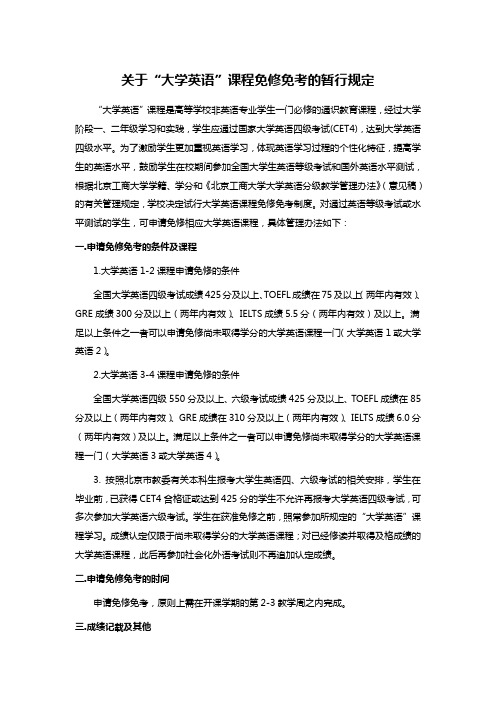
全国大学英语四级 550 分及以上、六级考试成绩 425 分及以上、TOEFL 成绩在 85 分及以上(两年内有效)、GRE 成绩在 310 分及以上(两年内有效)、IELTS 成绩 6.0 分 (两年内有效)及以上。满足以上条件之一者可以申请免修尚未取得学分的大学英语课 程一门(大学英语 3 或大学英语 4)。
75-79
80-84
85-89
90-94
95 及以上
IELTS
5.5
6
6.5
7
7.5
GRE
300
312+4
320+4
326+4
332+4.5
英语课程成绩
75
80
85
90
95
3.学生获得 CET-4、CET-6、TOEFL、IELTS、GRE 的成绩报告单后,欲申请免修 免考,须提供有关免修的相关材料,其中包括:(1)填写《北京工商大学〈大学英语〉 免修免考申请表》一式三份(附件 1);(2)英语成绩单原件;(3)英语成绩单复印件 及打印官网查询成绩截图三份,学生将以上材料报学生所在学院。经学生所在学院汇总 审核后,学院除提交免修免考申请表、成绩单复印件和打印官网成绩查询截图外,同时 提交《北京工商大学〈大学英语〉免修学生名单及成绩汇总表》一式三份(附件 2), 报外国语学院批准后,由外国语学院报教务处核准备案。审批结果由学生所在学院通知 学生,外国语学院负责学生期末成绩的折算登分。
二.申请免修免考的时间
申请免修免考,原则上需在开课学期的第 2-3 教学周之内完成。
三.成绩记载及其他
1.获准免修的学生,不再参加相应学期“大学英语”课程的学习与考核。获准免修 的“大学英语”课程的成绩,根据其提供的英语考试(全国大学生英语四、六级以及 TOEFL、GRE、IELTS)成绩,按下述方法折算。
大学英语教材都是几级
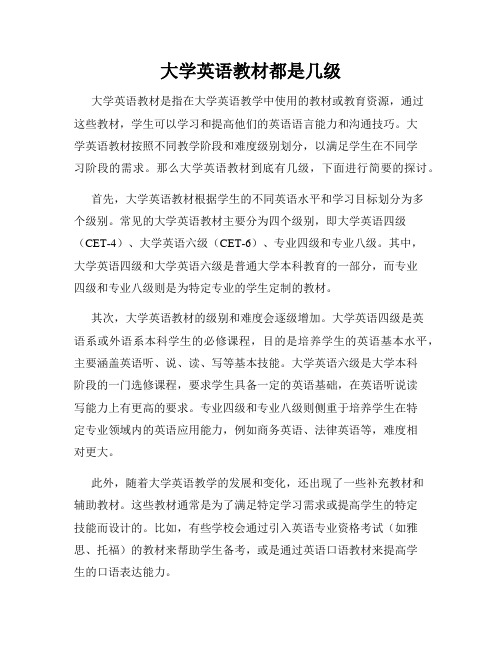
大学英语教材都是几级大学英语教材是指在大学英语教学中使用的教材或教育资源,通过这些教材,学生可以学习和提高他们的英语语言能力和沟通技巧。
大学英语教材按照不同教学阶段和难度级别划分,以满足学生在不同学习阶段的需求。
那么大学英语教材到底有几级,下面进行简要的探讨。
首先,大学英语教材根据学生的不同英语水平和学习目标划分为多个级别。
常见的大学英语教材主要分为四个级别,即大学英语四级(CET-4)、大学英语六级(CET-6)、专业四级和专业八级。
其中,大学英语四级和大学英语六级是普通大学本科教育的一部分,而专业四级和专业八级则是为特定专业的学生定制的教材。
其次,大学英语教材的级别和难度会逐级增加。
大学英语四级是英语系或外语系本科学生的必修课程,目的是培养学生的英语基本水平,主要涵盖英语听、说、读、写等基本技能。
大学英语六级是大学本科阶段的一门选修课程,要求学生具备一定的英语基础,在英语听说读写能力上有更高的要求。
专业四级和专业八级则侧重于培养学生在特定专业领域内的英语应用能力,例如商务英语、法律英语等,难度相对更大。
此外,随着大学英语教学的发展和变化,还出现了一些补充教材和辅助教材。
这些教材通常是为了满足特定学习需求或提高学生的特定技能而设计的。
比如,有些学校会通过引入英语专业资格考试(如雅思、托福)的教材来帮助学生备考,或是通过英语口语教材来提高学生的口语表达能力。
综上所述,大学英语教材根据学生的不同英语水平和学习需求划分为多个级别,包括大学英语四级、大学英语六级、专业四级和专业八级等。
这些教材的级别和难度逐级增加,旨在提高学生的英语能力和应用水平。
同时,还会根据学生的特定需求出现一些补充教材和辅助教材,以满足学生的不同学习需求和提高特定技能。
通过合理选择和使用这些教材,学生可以更好地学习和掌握英语知识,提高他们的英语综合能力。
- 1、下载文档前请自行甄别文档内容的完整性,平台不提供额外的编辑、内容补充、找答案等附加服务。
- 2、"仅部分预览"的文档,不可在线预览部分如存在完整性等问题,可反馈申请退款(可完整预览的文档不适用该条件!)。
- 3、如文档侵犯您的权益,请联系客服反馈,我们会尽快为您处理(人工客服工作时间:9:00-18:30)。
再举个例子
• 2012年6月大学英语四级真题 • 快速阅读 • 见讲义。
我们碰到的高频词汇和短语
• • • • • • • • 1. pick on, pick up 2. in terms of 3. physical/psychological 4. be due to 5. social status 6. a state of constant fear 7. abuse 8. peer
• 1. turn down/refuse/reject/object(to)doing sth/inject/rejection • 2. under this circumstance/in this situation/in this case • 3. approach • n. solution • vi. come near to/approach to • vt. To deal with / • eg. Approach/address the problem • 4. victim • 5 witness n. v.
长句子
• One group did aerobic training three times a week for one hour; the other did non-aerobic stretching and toning. • MRIs taken after three months showed that the aerobic group actually increased their brain volume and white matter in the frontal lobes, which contribute to attention and memory processing.
长句子
• Last year, a study made my Shea and Amy Chan, PhD, found that mice suffering from the equivalent of normal human age-related memory loss or early Alzheimer's disease got a memory boost when they consumed a daily dose of apple juice. • Shea has begun clinical trials to determine whether humans get a similar benefit.
• 1. flourish 繁荣兴旺/flourishing/flourishment • thrive/thriving/thrive • prosper/prosperous/prosperity • 2. promise/hope • Eg. But the markets all offer what the west does not-the promise of substantial growth. • 但这些市场都提供乐西方市场所不具备的 东西--大幅增长的希望。 • 3. trade off 交换,交易,权衡 • 4. 部分倒装句。另见 • 5. decade/dozen/score/fortnight/overnight
题外话 非谓语动词:现在分词和过去分词
• You may ask the lady sitting at the desk. • Some of the experiments described in the book are easy to understand.
• Hearing the knock on the door, they stopped talking. • Asked to work overtime that evening, I missed a wonderful film. • They stood there, waiting for the bus. • The bandits fled into the mountains, pursued by the policemen.
• 1. concern • concern oneself with sth.=关心 • as far as I am conerned 就我而言 • concern n. sth has aroused wide concern • it is not my concern. n. 关心 • concerning 关于 • Eg. He heard nothing concerning this matter. • concerned adj.关切,忧虑的 • be concerned about sth.
• 1. care about/care for/take care of/carefree/careless/careful • 2. cyber • 3. suffer from/suffering • 4. commit a crime/commit suicide/be committed to/commitment/ criminal • 5. end up doing sth. • Eg. Get this right, and you might end up enjoying the waiting more than her arrival. • End up with sth. • Eg. Many of us end up with jobs like that.
• The hunters fired, wounding one of the wolves. • The boys returned, their face covered with sweat.
1. __________ by the police, the kidnappers had no choice but to surrender. 2. (To be surrounded, Surrounded, Having surrendered, Surrounding) 3. __________ a hot day, they went swimming. (Being , It was ) 4. 3. Electric charges ____ in a circuit can do work. 5. (flowed, flowing, to flow, having flowed) 6. 4. ________ (enter) the room, the messenger collapsed, his face ____ (cover) with sweat.
定位后的处理
• 1. 上下求索。 • 2.词义猜测,可结合本段大意以及构词法。 • 3. 长句分析
长句分析
• • • • • • 1.完整句子的概念。 主语+谓语+宾语 2. 谓语和非谓语。 3. 非谓语结构 4. 主句和从句 5. 一切以动词为核心。
长句子
• When plaque, caused by "bad" LDL cholesterol, builds up in blood vessels, it can hinder circulation to the brain, depriving it of essential nutrients.
• 1. noticeable/obvious/apparent/distinct/evident • 2. counter-相反的 • counterattack • countercurrent • countertrend • 3. anti-反对,抵抗 • antibiotic 抗生的,抗菌的 • antibody • 4. urban/suburban/rural • 5. split up • 6. boast/brag
填空题的处理
• 归根到底应该为长句子的分析。 • 掌握词的各种词性的形式。 • 注意同义词。
填空题的处理
• 8. According to Shea, whether humans who are suffering from age-related memory loss or early Alzheimer's disease can ge t a similar benefit of memory boost as the mice is ____________.
• As you get older, drgus tend to stay in your system for a longer period of time, increasing the likelihood of troublesome interactions. • Any drug-related impairment will likely improve as soon as the drug is discontinued. • Apples have just the right dose of antioxidants to raise levels of acetycholine, a neurotransmitter that is essential to memory and tends to decline with age.
文章主旨的寻找
• 开头段落--开头段落的第一句,或开头 段落的最后一句。--若有转折词,则为 转折词后的一句。 • 文章结尾--结论段--必读段
逻辑词有那些呢?
• P13 • p17
• 段落中心句和细节的关系。 • 段落主旨=细节
线索词的寻找
• 线索词=特征词 • 数字,人名,地名,修饰语
• 注意:全文话题词不可以做线索,无从寻 觅,到处都是。
• • • • •
• • • • •
